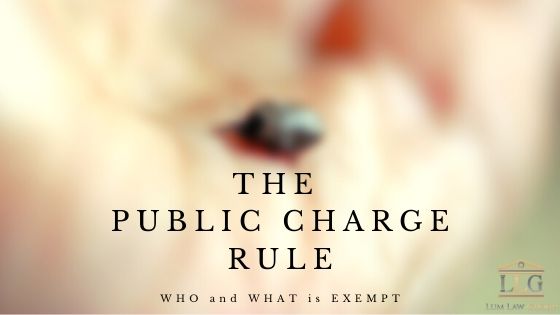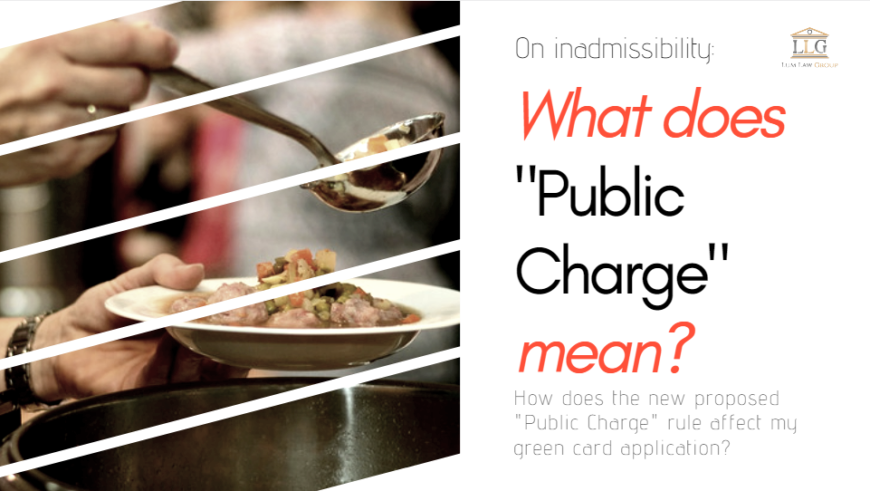We have noticed conflicting information regarding the recent proposed changes to the existing public charge inadmissibility grounds. To read the actual notice published on October 10, 2018, the Notice of Proposed Rulemaking, from United States Citizenship & Immigration Services (USCIS), please click here. We hope this article will clarify the key questions our clients ask us regarding the current public charge policy, the proposed public charge rule, and how the changes may affect their applications, requests, and motions for adjustment of status.
What does “Public Charge” mean?
A “public charge” is a person who may become dependent on government handouts based on a number of factors, such as whether the person has already received government assistance.
The government determines whether or not an alien will become a Public Charge by considering the following:
- Whether the alien currently receive government cash assistance;
- whether the alien have received government cash assistance in the past;
- the alien’s age;
- the alien’s health;
- the alien’s family status;
- the alien’s assets;
- the alien’s resources;
- the alien’s financial status; and
- the alien’s education and skills.
When does “public charge” inadmissibility matter?
For immigration purposes, “public charge” applies when USCIS has to determine an alien’s admissibility, which can happen in two situations:
- When the alien applies to enter the United States;
- When the alien applies to adjust status to permanent residence (green card)
The “public charge” inadmissibility does not apply for naturalization purposes (citizenship applications).
What counts towards making one a “public charge”?
Here are a few key factors that count toward whether an alien is considered a public charge:
- Government cash assistance for the alien;
- Government cash assistance for the alien’s family if the alien’s overall household income is below Federal Poverty Guidelines;
- Supplemental Security Income (SSI), such as:
What government benefits do not count towards “public charge”?
USCIS outlines the following non-cash programs as supplemental to your existing income, and therefore do not count towards making an alien a “public charge”:
- Medi-Cal or Medicaid;
- Healthy Families, or Children’s Health Insurance Program (CHIP);
- Nutrition programs, e.g., CalFresh Food Stamps, Special Supplemental Nutrition Program for Women, Infants, and Children (WIC), National School Lunch and School Breakfast Program;
- Housing benefits;
- Child care services;
- Energy assistance, such as the Low Income Home Energy Assistance Program (LIHEAP);
- Emergency disaster relief;
- Foster care and adoption assistance;
- Educational assistance, e.g., Head Start;
- Job-training programs;
- Community-based programs, e.g., soup kitchens, short-term shelter.
Cash benefits that you earned also do not count towards public charge. Examples of earned cash benefits include social security benefits, unemployment benefits, government pensions, and veterans’ benefits.
But I’m a refugee/asylee and have no money–will I be denied for being a “public charge”?
USCIS states that the public charge inadmissibility grounds do not apply to everyone and that certain groups may be allowed to enter or adjust status despite falling under the “public charge” determination. These groups include:
- Refugees;
- Asylum applicants;
- Refugees and asylees applying for green cards;
- Amerasian Immigrants;
- Anyone with approved relief under CAA, NACARA, HRIFA;
- T-visa applicants;
- U-visa applicants;
- T-visa holders trying to adjust status (green card);
- U-visa holders trying to adjust status (green card);
- Applicants for Temporary Protected Status;
- Certain applicants under LIFE Act Provisions.
What if I am in removal proceedings (immigration court)?
The current regulations for determining whether an alien in removal proceedings is a public charge are more strict. The Board of Immigration Appeals (BIA) has determined that inadmissibility based on public charge is based on the “totality of the alien’s [financial] circumstances at the time of […] application.”
In addition, aliens in removal proceedings can be ruled as public charges if any of the following circumstances apply:
- mental disability;
- physical disability;
- advanced age; or
- other fact “reasonably tending to show that the burden of supporting the alien is likely to becase on the public”
What are the proposed changes to the existing public charge grounds?
The impact of the proposed rule is twofold:
- It would tighten the way the government determines whether you will ever become a public charge;
- It would make it more difficult for certain individuals to obtain visas to enter the United States.
For any non-immigrant alien who is already in the U.S. and who may be considered a “potential public charge”, the proposed changes will disallow any extension of stay in the same visa category, hinder them from changing to another non-immigrant visa classification, and prevent them from adjusting their status (green cards).
How will the new rule be more strict on government benefits?
The new proposed rule is less relaxed when it comes to the receipt of benefits.
First, it counts “easily monetized” non-cash benefits as cash benefits, which means it will include SNAP/food stamps, rental assistance, and Section 8 vouchers among others.
Second, it limits the total amount of cash benefits a household can receive within 12 consecutive months to 15% of the Federal Poverty Guidelines. For example, in 2018 15 percent in a household of one is $1,821, so if an alien were to receive more than $1,821 in a year, then that alien would fall under “public charge” and be ineligible for adjustment of status or admission.
Third, regarding non-cash benefits that are not “easily monetized”, such as Medi-cal or Public Housing, the new rule limits the number of months to 12 in a 36 month period (non-cumulative). This means that if an alien has Medi-cal for more than one year within a three year period, they would be considered inadmissible and ineligible on the grounds of public charge.
Fourth, the proposed rule introduces a new standard, which is the combination of benefits. If an alien is likely to receive a cash or “easily monetizable non-cash benefit” in addition to a non-cash benefit for a period of 9 months or longer, then the alien is automatically considered a public charge.
Finally, the new proposed rule will carefully consider the affidavit of support (I-864) when required in an alien’s application.
What does the new proposed rule NOT do?
The proposed rule does not affect the benefits of dependents or other household members. Any cash benefit for the alien’s dependents would not count towards the alien’s household income.
Certain benefits are also not considered, such as Head Start, national school lunch programs, foster care and adoption, emergency medical assistance, and disaster relief.
What other factors will the new rule consider for public charge?
USCIS states that the following “weigh heavily” in finding an alien is likely to become a public charge:
- The alien is not a full-time student and work authorization (work permit) but cannot show current employment.
- The alien does not have a good work history.
- The alien does not have the experience or training necessary to show “reasonable prospect of future employment”.
- The alien currently receives, is certified, or has been approved to receive one of the public benefits above the allowed threshold;
- The alien has received one or more of the public benefits above threshold within the last 36 months;
- The alien has a medical condition that is likely to require extensive medical treatment or institutionalization that will interfere with the alien’s ability to provide for himself;
- The alien has a medical condition that requires extensive medical treatment and it seems unlikely he will be able to afford private health insurance;
- The alien has previously been found inadmissible or deportable based on a public charge.
What will prevent me from being considered a “public charge”?
To prove that you are not at risk of becoming a public charge, you can prove that you have sufficient financial assets, resources, and support amounting to at least 250% of the Federal Poverty Guidelines for your household size.
Alternatively, you can prove that you are currently working and have an annual income of at least 250% of the Federal Poverty Guidelines for your household size.
For your reference, for a household of two, say husband and wife, the alien would have to earn at least $41,150 (individual, not combined income). For a household of four, say husband and wife with two kids, the alien would have to earn at least $62,750. For a family of six, say husband and wife and one set of grandparents, the alien would have to earn at least $84,350.
When does the new rule go into effect?
The new rule is still “proposed” (and not “final”), and will be published in the federal registry by the end of the year. After which, it will be open for “comment” for 60 days. It is possible that adjustments will be made to the rule, or that it will not pass.


